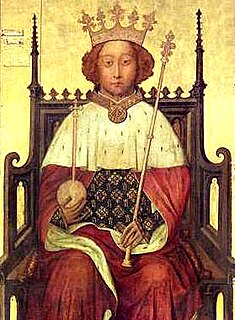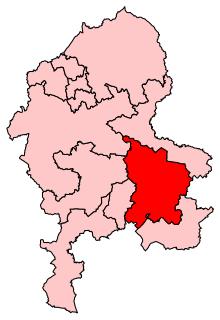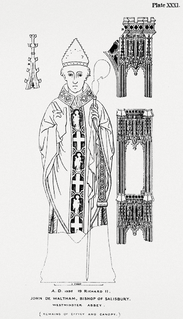Related Research Articles

Richard III was King of England and Lord of Ireland from 26 June 1483 until his death in 1485. He was the last king of the House of York and the last of the Plantagenet dynasty. His defeat and death at the Battle of Bosworth Field, the last decisive battle of the Wars of the Roses, marked the end of the Middle Ages in England. He is the protagonist of Richard III, one of William Shakespeare's history/tragedy plays.

Richard II, also known as Richard of Bordeaux, was King of England from 1377 until he was deposed in 1399. He was the son of Edward, Prince of Wales, and Joan, Countess of Kent. Richard's father died in 1376, leaving Richard as heir apparent to his grandfather, King Edward III; upon the latter's death, the 10-year-old Richard succeeded to the throne.

John Fisher was an English Catholic bishop, cardinal, and theologian. Fisher was also an academic and Chancellor of the University of Cambridge. He was canonized by Pope Pius XI.
Sir James Tyrrell was an English knight, a trusted servant of king Richard III of England. He is known for allegedly confessing to the murders of the Princes in the Tower under Richard's orders. William Shakespeare portrays Tyrrell as the man who organises the princes' murder in his 1593 play Richard III.
John Holland, 1st Duke of Exeter, 1st Earl of Huntingdon, KG, of Dartington Hall in Devon, was a half-brother of King Richard II (1377–1399), to whom he remained strongly loyal. He is primarily remembered for being suspected of assisting in the downfall of King Richard's uncle Thomas of Woodstock, 1st Duke of Gloucester (1355–1397) and then for conspiring against King Richard's first cousin and eventual deposer, Henry Bolingbroke, later King Henry IV (1399–1413).
Aldersgate is a Ward of the City of London, named after one of the northern gates in the London Wall which once enclosed the City.

Richard Fitzalan, 4th Earl of Arundel, 9th Earl of Surrey, KG was an English medieval nobleman and military commander.
John Northampton was a reformist Lord Mayor of London in 1381 and 1382, during dissension in favour of reform of its Common Council in the early years of Richard II's reign. When the oligarchic leaders of London were able to engineer the overthrow of his faction, even the book of records of reform legislation was burned, known as the Jubilee book. The mob politics of such radical movements increased the uneasiness of the great about allowing popular participation in government.

Lichfield is a constituency in Staffordshire represented in the House of Commons of the UK Parliament since its 1997 recreation by Michael Fabricant, a Conservative.

John Waltham was a priest and high-ranking government official in England in the 14th century. He held a number of ecclesiastical and civic positions during the reigns of King Edward III and Richard II, eventually rising to become Lord High Treasurer, Lord Privy Seal of England and Bishop of Salisbury. He is buried in Westminster Abbey, London.

Richard Mitford was an English bishop of Chichester from 17 November 1389, consecrated on 10 April 1390, and then bishop of Salisbury. He was translated to the see of Salisbury on 25 October 1395.
Events from the 1380s in England.
Events from the 1390s in England.

Lieutenant-General Richard Onslow was a British Army officer and politician. After the death of their parents, his older brother Arthur bought him a captain's commission in the British Army. He first saw action in the Anglo-Spanish War in 1727, after which he was returned to Parliament for the family borough of Guildford. His political contributions were negligible in comparison to his brother, and he continued to serve as a career officer, holding commands in the War of the Austrian Succession at Dettingen and Fontenoy. In 1759, he was appointed Governor of Plymouth and commander of the Western District, and died as a lieutenant-general the following year while presiding over two prominent courts-martial.

John Doreward was a Serjeant-at-law and Speaker of the House of Commons of England.
John Montagu, 3rd Earl of Salisbury and 5th and 2nd Baron Montagu, KG was an English nobleman, one of the few who remained loyal to Richard II after Henry IV became king.
Dr Richard Gwent was a senior ecclesiastical jurist, pluralist cleric and administrator through the period of the Dissolution of the Monasteries under Henry VIII. Of south Welsh origins, as a Doctor of both laws in the University of Oxford he rose swiftly to become Dean of the Arches and Archdeacon of London and of Brecon, and later of Huntingdon. He became an important figure in the operations of Thomas Cromwell, was a witness to Thomas Cranmer's private protestation on becoming Archbishop of Canterbury, and was Cranmer's Commissary and legal draftsman. He was an advocate on behalf of Katherine of Aragon in the proceedings against her, and helped to deliver the decree of annulment against Anne of Cleves.

Sir Nicholas Exton was a medieval English merchant. A leading member of the Fishmongers' Company and citizen of the City of London, he was twice elected Mayor of that city during the troubled years of the reign of King Richard II. Little is known of his personal background and youth, but he became known at some point as a vigorous defender of the rights of his Guild. This eventually landed him in some trouble for attacking the then-current Mayor, and he was fined and imprisoned as a result. The situation soon reverted to his favour with the election as Mayor of Nicholas Brembre, a close ally of his. During this period Brembre was a loyal supporter of the King, who at this time was engaged in a bitter conflict with some of his nobles. They managed to manoeuvre the King into surrendering some of his authority, and this, in turn, weakened Brembre, who was eventually executed by the Appellants for his support of the King.

The City of London swords are five two-handed ceremonial swords owned by the City of London, namely the Mourning Sword, the Pearl Sword, the State Sword, the Old Bailey Sword and the Mansion House Justice Room Sword. A sixth sword, the Travelling Sword of State, replaces the Sword of State for visits outside the City. They are part of the plate collection of Mansion House, the official residence of the Lord Mayor of London.

John Fresshe was a citizen, alderman, and Mayor of London in the latter years of the fourteenth century. A merchant by trade, he was a member of the Mercers' Company, a medieval London trade guild, and has been described as one of London's "leading citizens at the end of the century".
References
- 1 2 Barrett, Edward (2017). Ceremonial Swords of Britain: State and Civic Swords. The History Press. p. 119. ISBN 978-0-7509-6244-5.
- ↑ Sharpe, Reginald R., ed. (1907). Calendar of Letter-Books of the City of London. Vol. H: 1375–1399. London: His Majesty's Stationery Office. folios CLXXIII b and CLXXV (pp. 422–433). Retrieved 2 February 2018– via British History Online.
- ↑ Carpenter, John; Whittington, Richard (1862) [1419]. Liber Albus: The White Book of the City of London. Translated by Riley, Henry Thomas. John Russell Smith. p. 479. Retrieved 2 February 2018.